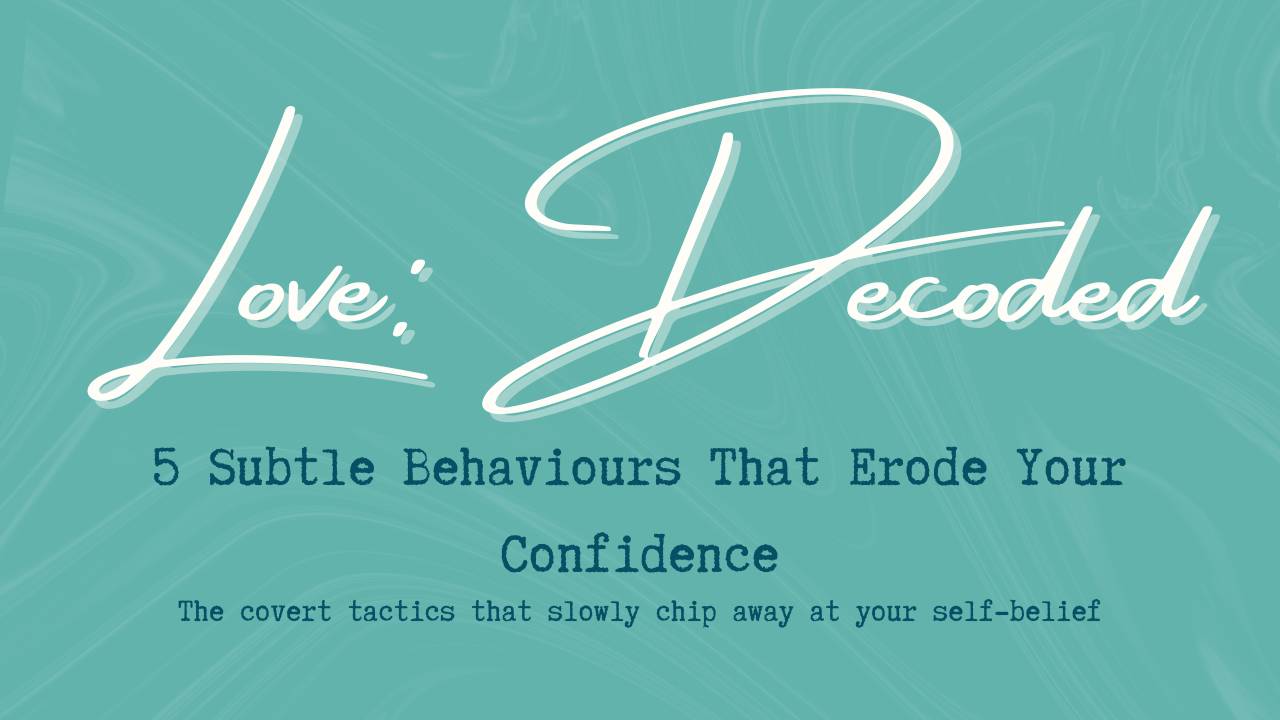
The 5 Subtle Behaviours That Erode Your Confidence Over Time
Aug 11, 2025When we think about confidence-shattering relationships, most of us picture obvious put-downs, explosive arguments, or blatant control.
But in reality, the most damaging behaviours are often the quietest.
They don’t slam into you like a storm - they slip under the door like a draft, unnoticeable at first, until one day you realise you’re constantly cold.
These behaviours are subtle enough that you might question whether they’re even “that bad.”
That’s the danger.
Over time, they chip away at your self-worth until you barely recognise yourself.
Here are five of the most common confidence eroders I see in my work - and how they play out.
1. The Disguised Insult
It’s framed as a joke.
It’s “just banter.”
It’s said with a smile so convincing that if you call it out, you risk being labelled “too sensitive.”
But your body knows the difference between affection and attack.
These subtle digs - especially about your intelligence, appearance, or capabilities - stick in your mind like burrs.
2. The ‘For Your Own Good’ Critique
Constructive feedback is healthy. But when every choice you make - from the way you dress to the friends you keep - is met with “concern,” you start second-guessing yourself.
They’ll say they’re “just trying to help.” The truth? They’re training you to outsource your judgement to them.
3. The Silent Treatment Spiral
Withholding communication might not leave visible bruises, but it leaves deep emotional dents.
You’re left replaying every interaction, wondering what you did wrong, becoming more focused on fixing their mood than trusting your own feelings.
4. The Shrugged-Off Achievement
You land a win at work.
Your new recipe is a hit at dinner.
You share it - and they barely react.
The absence of recognition might seem small, but over time it teaches you that your successes aren’t worth celebrating.
5. The ‘You’re Overreacting’ Dismissal
Your feelings are real.
They matter.
But when someone repeatedly tells you you’re “too dramatic,” “overreacting,” or “making a big deal out of nothing,” it warps your self-perception.
Soon, you’re editing your emotions before you even express them.
Why These Work So Well
From a psychological perspective, these behaviours often trigger cognitive dissonance - the discomfort of holding two conflicting beliefs:
They love me
and
They hurt me.
When the hurt is subtle, your brain works overtime to minimise it. You downplay it to maintain the “love” belief, but that process slowly erodes your trust in yourself.
The Bottom Line
You don’t need proof of malice to acknowledge harm.
If you feel smaller, less capable, or unsure of yourself in a relationship, that’s a signal worth listening to.
These small cuts heal faster when you see them for what they are - and stop blaming yourself for the bleeding.
Want to get clear on whether your relationship is building you up or chipping you down?
Download The Relationship Mirror Toolkit - my free guide to help you reflect on what’s really going on, spot unhealthy dynamics, and start rebuilding trust in yourself.
👉 Download it here.
I'd love to hear from you with your thoughts about this blog. Email me at [email protected] with your feedback, experiences and ideas for other blog posts you'd like to see coming your way!
Eve x
Founder, The Healthy Relationship Company
📲 @thehealthyrelationshipcompany
📧 [email protected]
Stay in the loop!
Get psychology-backed relationship tips straight to your inbox.
We hate spam. We will never sell your information, for any reason. By subscribing to The Clarity Drop Newsletter, you also agree to receive occasional updates and marketing. We will only send things that would be genuinely useful to you. Unsubscribe at any time.
